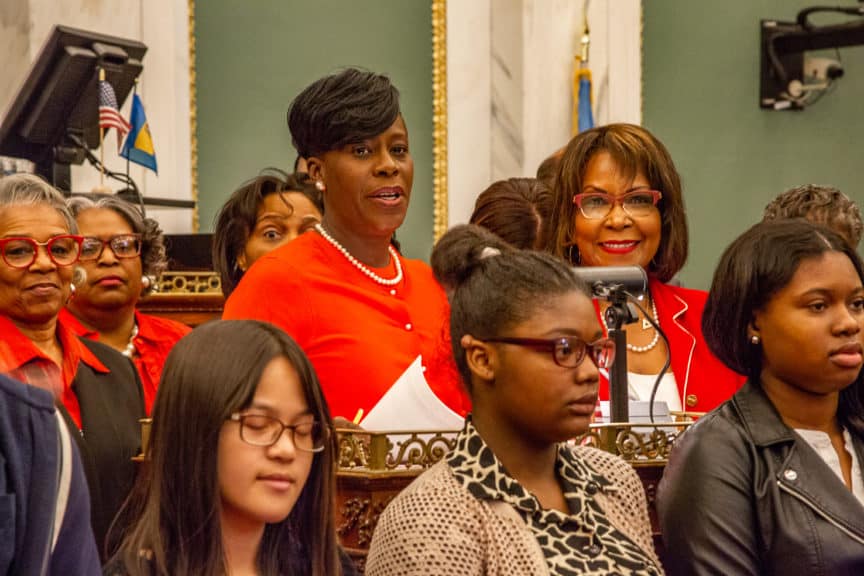PHILADELPHIA, PA, February 14, 2019 – Councilwoman Cherelle Parker (9th District) today introduced legislation, co-sponsored by Council members Mark Squilla (1st District) and Blondell Reynolds Brown (At-Large), that would put a question on the May ballot regarding increasing Pennsylvania’s minimum wage to $15 per hour by 2025.
Gov. Wolf recently proposed raising the minimum wage to $12 an hour on July 1, 2019 with gradual 50 cent increases until reaching $15 an hour in 2025. Pennsylvania’s minimum wage of $7.25 – the same as the federal minimum wage – has been unchanged for the past 10 years, while the cost of living has risen more than 13 percent since 2009. In the past decade, 29 states, including all of our neighboring states, have raised the wage floor for their workers, with the District of Columbia planning to increase its minimum wage to $15 by 2020, and New Jersey planning to hike its minimum wage to $15 by 2024.
“It is past time that all working Pennsylvanians be able to earn a living wage that enables them to afford the basic necessities and provide for their families,” said Parker, chair of Council’s Committee on Labor and Civil Service. “Increasing the minimum wage will benefit all of our neighborhoods, including often overlooked middle neighborhoods, and allow workers to put the additional earnings right back into their communities. In light of the Governor’s recent proposal, I think it’s time for Philadelphians to weigh in on this issue.”
The referendum would ask voters to amend the Philadelphia Home Rule Charter to call upon the General Assembly to raise the minimum wage to $15 by 2025 or alternatively to allow the City of Philadelphia to increase the minimum wage in Philadelphia.
The City cannot increase the minimum wage alone. Philadelphia is preempted by PA State Act 112 from passing any minimum wage law, which means that minimum wage changes must occur at the state level.
James F. Kenney, Mayor, City of Philadelphia: “There are far too many Philadelphians who have full-time jobs, or even multiple jobs, and still have a hard time getting by. This is unacceptable and we need to do more to ensure that hard-working people are able to support themselves and their families. The best way we can do this is to make sure that all of our residents earn a living wage. I’m proud to stand with Councilwoman Parker as she introduces this bill to put this important referendum on the ballot – which is sure to demonstrate the strong support among Philadelphians for increasing the minimum wage.”
Mark Squilla, 1st District Councilman, Philadelphia City Council: “With household incomes dropping, I’ve seen first hand the struggles of many Philadelphians — in my district and across the city. I’m proud to sponsor a measure that will boost the opportunities and dreams of many of those caught in such a struggle. I look forward to working with my colleagues on Council to advance this legislation and have our residents vote on this measure.”
Blondell Reynolds Brown, Majority Whip, Philadelphia City Council: “Increasing the minimum wage in Philadelphia and across the Commonwealth of Pennsylvania is simply overdue. Hard-working Pennsylvanians should not expect to support themselves and their families while earning $7.25 per hour. I commend Councilwoman Parker for introducing this legislation and look forward to hearing from my fellow Philadelphians on this essential question of economic justice.”
Increasing the minimum wage will be especially crucial to 63,000 Philadelphians, ages 20 to 65, who work but currently live in or near poverty.
Despite opposition, new research finds strong evidence that increasing the minimum wage does not lead to a loss in low-wage jobs, but actually raises incomes. In fact, sectors that employ many minimum-wage workers, such as the food service sector, have not been harmed by increased minimum wages. This includes the fact that for most employees, working hours do not decrease when minimum wage increases, and for those that did work fewer hours after an increase in minimum wage, the hourly wages for this group went up enough that their overall incomes remained the same. As an example, Pennsylvania’s neighboring states all have higher minimum wages, and in their food service sectors, wages have increased and employment has increased faster than in Pennsylvania’s food service sector.
###
Councilwoman Cherelle L. Parker represents the 9th District, which includes East Mt. Airy, West Oak Lane, East Oak Lane, Lawncrest, Burholme, Olney, Oxford Circle and Logan. She is Chair of Council’s Committee on Labor and Civil Service and Vice Chair of Council’s Committee on Commerce and Economic Development.


